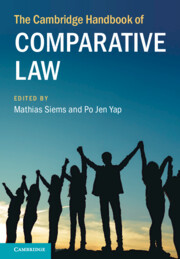Book contents
- The Cambridge Handbook of Comparative Law
- The Cambridge Handbook of Comparative Law
- Copyright page
- Contents
- Figures
- Tables
- Contributors
- Preface
- Abbreviations
- 1 Introduction
- Part I Methods of Comparative Law
- Part II Legal Families and Geographical Comparisons
- Part III Central Themes in Comparative Law
- Part IV Comparative Law beyond the State
- 28 Comparative International Law
- 29 Transnational Regulation
- 30 Quantitative Forms of Legal Governance
- 31 Comparative International Arbitration Law
- 32 Cross-Border Judicial Dialogue
- 33 Comparing Regional Law
- 34 Comparative Conflict of Laws
- 35 Comparative Indigenous Law
- 36 Comparative Legal Education
- Index
31 - Comparative International Arbitration Law
from Part IV - Comparative Law beyond the State
Published online by Cambridge University Press: 26 January 2024
- The Cambridge Handbook of Comparative Law
- The Cambridge Handbook of Comparative Law
- Copyright page
- Contents
- Figures
- Tables
- Contributors
- Preface
- Abbreviations
- 1 Introduction
- Part I Methods of Comparative Law
- Part II Legal Families and Geographical Comparisons
- Part III Central Themes in Comparative Law
- Part IV Comparative Law beyond the State
- 28 Comparative International Law
- 29 Transnational Regulation
- 30 Quantitative Forms of Legal Governance
- 31 Comparative International Arbitration Law
- 32 Cross-Border Judicial Dialogue
- 33 Comparing Regional Law
- 34 Comparative Conflict of Laws
- 35 Comparative Indigenous Law
- 36 Comparative Legal Education
- Index
Summary
It is said that ‘not many fields of law use comparative law as extensively as international arbitration’ (Vadi, 2010). Indeed, comparative approaches to international arbitration law have assumed greater importance in the study of both commercial and investment arbitration. This chapter explores the applications of comparative law methods in the developments of international arbitration law, reviews their key contributions, and suggests potential directions for future study. These methods, whether traditional, historical, linguistic, socio-legal, empirical, or economic have all been employed to varying degrees and varying effects in the study of international arbitration law. Drawing from key publications in the field, this chapter will explore the research focus, themes of enquiry, organisational structures, and analytical techniques of each method in turn as applied to comparative arbitration studies.
Keywords
- Type
- Chapter
- Information
- The Cambridge Handbook of Comparative Law , pp. 610 - 624Publisher: Cambridge University PressPrint publication year: 2024

